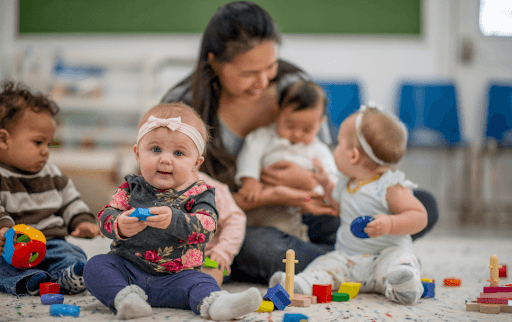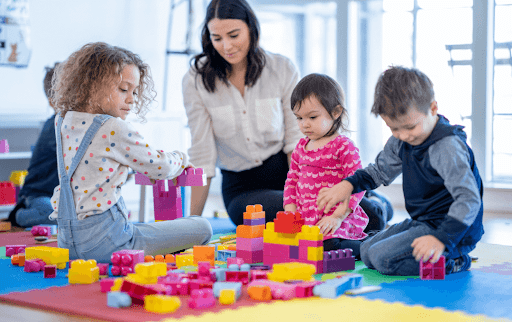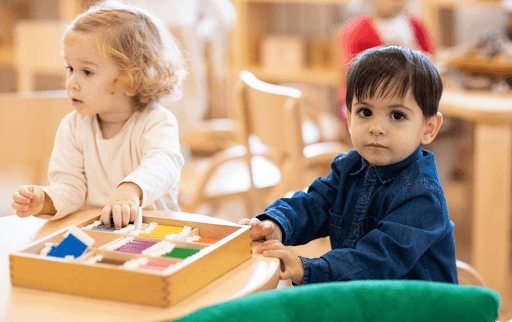Planning in the Early Years
Childcare Planning Cycle
Childcare planning is an important aspect of providing high-quality early years education and care.
Effective planning ensures that children receive a curriculum that meets their individual needs and interests, and that they are supported in their learning and development.
This article will explore the importance of planning in the early years, the role of observations in the planning process, and the Early Years Foundation Stage (EYFS) planning cycle.

Planning in the Early Years
 Planning in the early years is an essential aspect of providing high-quality childcare. The curriculum developed during this process serves as a blueprint for the learning experiences that children will engage in, allowing them to acquire knowledge, skills, abilities, and understanding.
Planning in the early years is an essential aspect of providing high-quality childcare. The curriculum developed during this process serves as a blueprint for the learning experiences that children will engage in, allowing them to acquire knowledge, skills, abilities, and understanding.
Effective planning takes into account the unique developmental stage and individual needs of each child, with a focus on supporting their interests and abilities. Additionally, it is important to consider the cultural and linguistic backgrounds of the children to ensure that the curriculum is inclusive and culturally responsive.
The ultimate goal of planning in the early years is to provide children with the skills and knowledge they need to succeed in school and beyond, by helping them to develop confidence, independence, and resilience.
Observations in Early Years
 Observations in the early years form an important part of the planning process. It is a crucial aspect of understanding each child’s individual needs and interests.
Observations in the early years form an important part of the planning process. It is a crucial aspect of understanding each child’s individual needs and interests.
Early years practitioners use observations to gather information about children’s developmental progress and learning styles to tailor their approach accordingly. Observations may be formal, such as those conducted during a structured assessment, or informal, such as those made during a child’s playtime or interactions with others.
It can take many forms, including written notes, photographs, videos, and audio recordings. They help practitioners to identify areas of strength and development for each child, and to create individualized plans that support each child’s unique needs. This approach ensures that each child is provided with the necessary tools and opportunities to thrive in their early years.
Observations are also important for building relationships with parents and carers. Sharing observations with parents and carers can help to strengthen communication and collaboration between home and the early years setting. This allows for a more comprehensive understanding of each child’s needs and promotes a positive and productive partnership between parents, carers, and practitioners.
Assessment in the Early Years Foundation Stage
Assessment in the Early Years Foundation Stage (EYFS) involves two primary types of evaluation. The first type is an ongoing assessment, which practitioners conduct daily to determine the child’s current learning level or what they have already learned. This type of assessment is called “formative” assessment as it helps determine the following steps to be taken by the child and the parent in their learning journey.
The second type of assessment, “summative” assessment, occurs twice during the Revised EYFS. The first summative assessment occurs when a child is between 24 and 36 months old. The results of this assessment get recorded, and parents and practitioners use the information to identify the child’s strengths and learning needs.
The second assessment occurs toward the end of the reception class when children are in their final term. This assessment summarizes all the information from ongoing assessments made about the child. This information is then added to a record of children’s achievement related to the Early Years Foundation Stage Profile (EYFSP), indicating the levels achieved by the child in the seven areas of learning and development in the Revised EYFS. It is important to note that the EYFSP is not a test.
Planning Cycle in EYFS
 The planning cycle in the Early Years Foundation Stage (EYFS) is a crucial process for early years providers to ensure that their curriculum is effective. The cycle consists of four stages:
The planning cycle in the Early Years Foundation Stage (EYFS) is a crucial process for early years providers to ensure that their curriculum is effective. The cycle consists of four stages:
- observation,
- assessment,
- planning,
- and evaluation.
The first stage, observation, involves gathering information about each child’s strengths, interests, and areas for development through formal and informal methods such as written notes, photographs, or videos.
The assessment stage involves analyzing the information gathered from the observations to identify each child’s progress and needs.
The planning stage involves using the information to plan appropriate activities and experiences that support each child’s learning and development.
The final stage, evaluation, involves reflecting on the effectiveness of the planned activities and experiences and making adjustments as needed.
The planning cycle is a continuous process that enables early years providers to provide a high-quality curriculum that is appropriate for the developmental stage and individual needs of each child.
Why is Planning Important?
 Planning is a crucial aspect of successful partnership working in the early years. It ensures that everyone involved, including practitioners, parents, and children, are working towards the same goals and priorities.
Planning is a crucial aspect of successful partnership working in the early years. It ensures that everyone involved, including practitioners, parents, and children, are working towards the same goals and priorities.
Effective planning supports children’s learning and development by providing them with a curriculum that is tailored to their individual needs, interests, and abilities. It also enables practitioners to monitor each child’s progress and assess their learning outcomes. Planning helps practitioners to identify any areas where a child may need additional support or intervention and provides opportunities for early intervention.
Involving parents and carers in the planning process ensures that they are aware of their child’s progress and can support their learning at home. Overall, effective planning is essential for delivering high-quality early years education and promoting positive outcomes for children.
Inviting Children To Shape Their Learning
One way to involve children in shaping their learning is by allowing them to participate in planning meetings with the practitioners. Preschoolers can discuss what they want to learn in the upcoming week and suggest ideas.
To improve their communication and language skills, one child takes the meeting minutes and attempts to write down the names of those present and form letters to make words that describe the suggestions. However, it’s important to note that this approach may not work with younger age groups. Alternatively, practitioners can photograph learning areas and activities and use them as prompts during planning sessions with younger children. This way, they can still have a say in their learning even if they cannot express it verbally.
Conclusion
In conclusion, planning is crucial to providing high-quality early years education and care. It enables practitioners to provide a curriculum that meets each child’s needs and interests and supports their learning and development. The planning cycle set out in the EYFS provides a valuable framework for early years providers to follow, and observations play a vital role in the planning process. By working collaboratively with parents and carers, early years providers can ensure that their curriculum is effective and meets the needs of each child.
Planning in the early years involves finding a balance between child-led and adult-led learning opportunities. Effective planning should be based on ongoing observations and assessments of children’s learning and development and should be flexible and responsive to their changing needs and interests. The EYFS framework provides a comprehensive guide to planning, observation, and assessment in early years settings.
FREQUENTLY ASKED QUESTIONS
What is childcare planning?
Childcare planning is the process of creating a curriculum and setting goals for children’s learning and development in a childcare setting.
Why is planning important in childcare?
Effective planning is important because it ensures that each child receives a curriculum that is tailored to their individual needs and interests, and supports their learning and development. It also enables practitioners to work in partnership with parents and carers, involving them in the planning process and sharing information about their child’s progress.
What is the planning cycle in early years?
The planning cycle in early years consists of four stages: observation, assessment, planning, and evaluation. This is a continuous process that enables practitioners to monitor each child’s progress, plan appropriate activities and experiences, and evaluate the effectiveness of their curriculum.
How do you involve parents in childcare planning?
Early years providers can involve parents in childcare planning by providing regular opportunities to give feedback, raising concerns, and sharing information about their child’s progress. Practitioners can also work collaboratively with parents and carers to identify and address any issues that arise.
What should be included in a childcare plan?
A childcare plan should include a curriculum that is appropriate for the developmental stage and individual needs of each child, taking into account their interests and abilities, as well as their cultural and linguistic backgrounds. The plan should be designed to enable children to develop the skills they need to be successful in school and later life.



